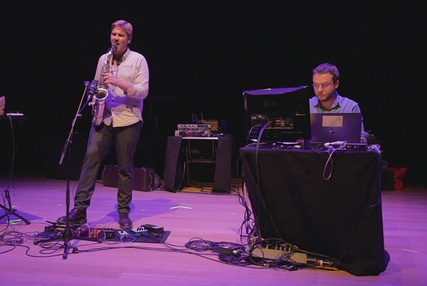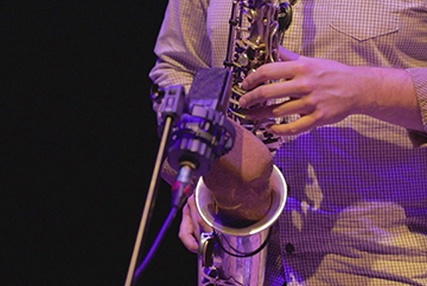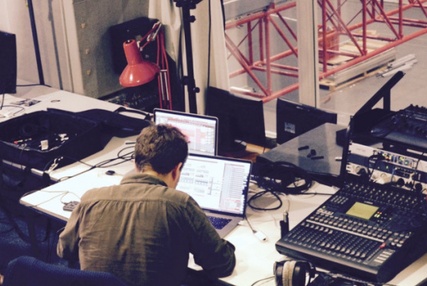Depuis une demi-douzaine d’années, le saxophoniste Rémi Fox est un cobaye — mais un cobaye volontaire. C’est donc volontairement que, périodiquement, il se rend dans les souterrains de l’Ircam pour se soumettre aux expériences des scientifiques.
Principalement ceux, autour de Gérard Assayag, qui constituent l’équipe Représentations musicales. Formé au jazz et à l’improvisation, Rémi Fox est en effet un sujet idéal pour tester des outils d’interaction musicales improvisées dans le cadre des projets Omax, SoMax, ou Improtech et, plus récemment, DyCI2, développé par Jérôme Nika.
Entre Fox et Nika, le courant passe immédiatement, et l’idée germe bientôt de travailler et se produire en duo : Fox au sax, éventuellement modulé par des pédales d’effets ou les traitements électroniques du logiciel Ableton Live, et Nika aux claviers (d’ordinateur), pilotant DyCI2.
C’est de ce duo appelé « C’est pour ça » qu’est né le désir d’une résidence de recherche artistique à l’Ircam, qui permettrait de bâtir un acte II de la collaboration, mais aussi de prendre le temps d’approfondir le sujet.
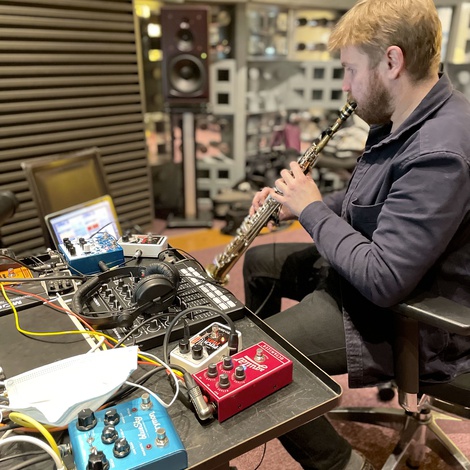
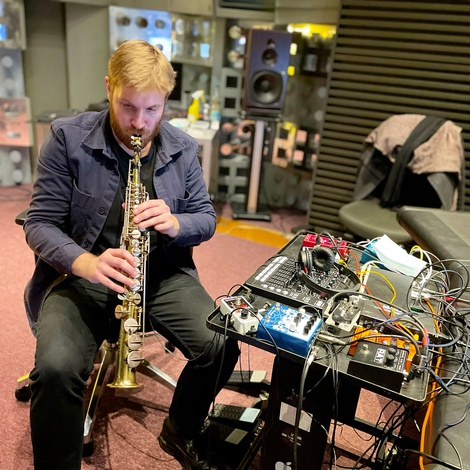
Rémi Fox en studio à l'Ircam © Deborah Lopatin
« La résidence nous donnera l’occasion de tester de manière exhaustive toutes les modalités de fonctionnement de l’outil, dit Rémi Fox. La machine peut ainsi travailler à partir d’une mémoire musicale déjà constituée ou en écoutant simplement son partenaire.
Ensuite, dans le flot de la performance, Jérôme « joue » de sa machine : il peut lui commander de me suivre ou pas, et de quelle manière, il peut lui demander de reprendre des phrases entières ou simplement des grains de son. Parfois, il peut vouloir que le discours produit sonne comme celui d’une machine (au sens où il serait impossible à un humain de sortir ce genre de phrase), ou, au contraire, qu’on ne sache plus distinguer la machine de l’humain. D’un extrême à l’autre, il y a toute une fourchette de possibles que nous sommes impatients d’explorer ».
Au-delà de la manipulation « locale », disons performative, du logiciel, le duo aura aussi à cœur de prendre du recul sur l’outil :« Si nous travaillons sur l’improvisation, celle-ci peut être, contrairement à ce que l’on peut penser de prime abord, très écrite : nous développons ainsi ce qu’on appelle des « méta-compositions », c’est-à-dire des improvisations qui sont prévues dans leurs grandes lignes, soit par des plans déterminés en amont (en se disant par exemple que, l’on interagira d’abord avec une mémoire musicale en particulier, puis avec une autre, et ainsi de suite, ou, de mon côté, sur des figures musicales), soit par des processus génératifs.
Il est important de se rappeler que c’est, en réalité, de la musique générative : elle est générée d’une part par Jérôme à partir des mémoires musicales dont on nourrit la machine, et d’autre part par les stimulus que je lui apporte. »
C’est d’ailleurs ce jeu fondamental sur la ou les mémoires musicales qui donne son titre au projet : « Hippocampe artificiel » – « l’hippocampe » étant une région-clef du cerveau s’agissant de la mémoire, et « l’artificiel » faisant un clin d’œil au concept d’intelligence artificielle.
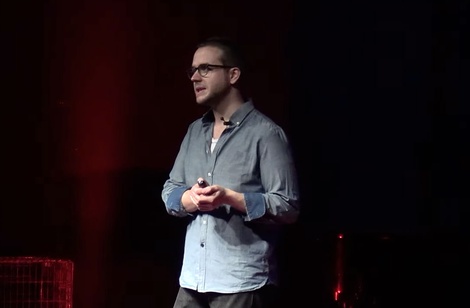
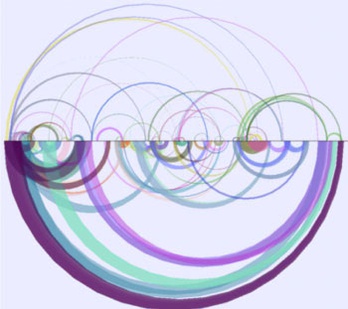
Jérome Nika lors du TEDx Composer l'interaction musicale humain-machine , a droite Schéma DyCI2
« Ici, précise Jérôme Nika, le logiciel joue le même rôle que l’hippocampe : c’est un instrument – et j’insiste sur le terme « instrument » : DyCI2 n’est pas une IA créative autonome – capable de mobiliser une mémoire, mais pour répondre à une intention musicale humaine. »
Pour Rémi Fox, la première étape du travail consiste en l’apprentissage du logiciel en lui-même dont la manipulation, pour l’heure, était le pré carré de Jérôme Nika.
« Jérôme est bien sûr un scientifique, mais dans notre duo c’est aussi et surtout un musicien dont l’instrument est son logiciel. Je veux donc moi aussi faire un pas vers lui et m’intéresser à l’aspect scientifique. L’idée est d’être capable de manipuler moi-même la machine, mais aussi de constituer de nouvelles mémoires musicales avec lesquelles la machine pourra travailler, pour constituer notre bibliothèque propre à partir de mon jeu de saxophone ou d’autres sons.
Mieux comprendre comment la machine fonctionne me permettra de mieux réagir à ce que fera Jérôme et de trouver de nouvelles manières d’interagir. Certes, à première vue dans notre duo, c’est Jérôme qui pilote la machine en jouant sur ses paramètres, mais je la pilote aussi, avec mes intentions musicales. Cette démarche d’apprentissage ne peut être que bénéfique aussi pour notre relation de travail : on ne peut que mieux se comprendre ! »

Dans les épisodes suivants, nous nous intéresserons plus en détail à chacun des aspects de ce travail, ainsi qu’aux membres de l’équipe Représentations musicales qui s’en occupent plus particulièrement.







